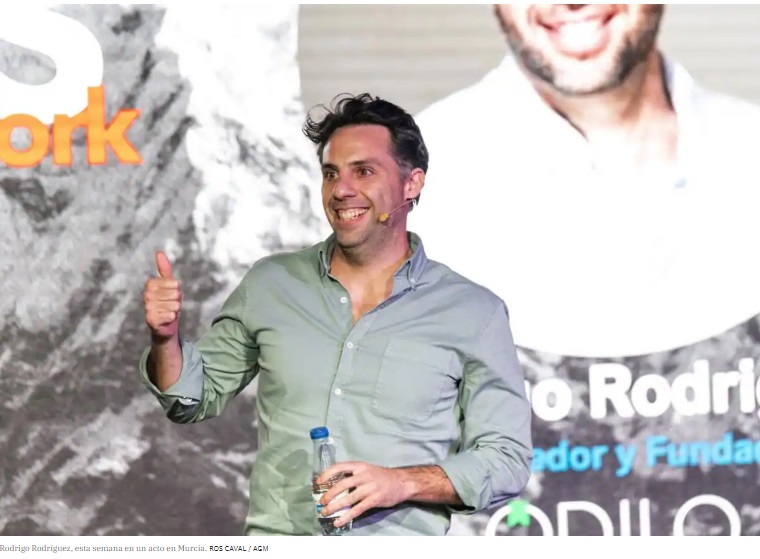Categories:
Article published by LA VERDAD
By: Fuensanta Carreres
Like many successful business ideas, the outline of ODILO, known as the ‘Netflix’ of education and learning, didn’t begin to take shape in the office of a multinational corporation. “It arose during a meal at home in Cartagena, with my father and brother, where we discussed digitizing a library so that content could reach more people.” Rodrigo Rodríguez (Cartagena, 1983), an engineer, worked in telecommunications between Madrid and London in 2012 and wanted to return to Cartagena. “But with my job, it was very difficult; then this idea came up, along with the drive from my brother, and we took the plunge.”
The journey since then is evidenced by the undeniable business figures exhibited by the educational content platform: ODILO now has over 170 million users in 54 countries, its library includes more than three million titles in various languages, 8,500 organizations work with its educational ecosystems, and in 2022, they closed the largest funding round in the educational technology sector in the history of Spain, valued at 60 million euros. The platform operates similarly to other music or audiovisual content platforms like Spotify and Netflix: it offers a vast library of content to users, mainly schools, universities, institutions… Instead of television series or music, ODILO’s library is comprised of educational resources, books, audiobooks, videos, and courses. The platform allows any organization to create its own “tailored learning ecosystem,” and what the CEO is most proud of is that users achieve learning by charting their own path: “Do we all really learn in the same way? For some, the path is a game, for others an audiobook… The ecosystems offer different options tailored to the institution that requires them.”
The First Client, in Colorado
ODILO’s beginnings were far from Spain. Rodrigo Rodríguez and his brother had to travel to the American state of Colorado to close their first client, and it’s surprising that their platform, used in hundreds of schools around the world, still has no presence in Murcian educational centers. “Perhaps the most difficult part was making the decision to start; we did it without a safety net, but with a great idea, and it was a challenge because we were happy in our jobs at that time. We had to make a decision, so initially, I left the company, which fortunately gave me options to return, while my brother stayed a little longer, and that’s how we supported each other in the early years of uncertainty, but it was my brother who had the drive and convinced me.”
The 170 million users learning with the content on their platform allow ODILO’s CEO access to invaluable data and conclusions. The platform uses machine learning to analyze users’ interests, learning styles, and progress, making it easier to recommend tailored content. “We can measure the hours spent learning specific subjects or topics, the type of content consumed… We can detect that a specific reading book causes students to continue reading other titles, and, conversely, another book is often left halfway. This data allows for total and constant personalization of the ecosystem for each user,” emphasizes Rodríguez, recognized by Forbes magazine as one of the 100 most creative people in the business world, driven by the goal of democratizing education and making “unlimited learning” accessible to more users.
The multinational hasn’t neglected its connection with Cartagena, where they maintain their main headquarters in the Cabezo Beaza industrial estate and sponsor the basketball team. Future plans go much further. “We maintain a very intense personal bond with Cartagena. We are planning a strong investment to start a content factory, and hopefully, we could establish it in the Region,” says ODILO’s CEO, who plans to create an ‘educational technology hub’ in his homeland.
